The following information will address the final issues/recommendations reported in the DAV study I have been summarizing/discussing in my recent blogs. Although they (DAV) made 27 recommendations, is it more likely than not, that there are more recommendations or ideas that could or should be addressed.
To conclude my research and documentation on the DAV study, the remaining areas of consideration will be addressed: employment, housing, and disability compensation.
Employment: Finding a job, whether or not you are a veteran or civilian, it is not an easy task in these days in which we live. However, for veterans, there are a number of resources available for the unemployed. And, for women veterans, the DoL has been actively offering many customized programs and support. Unfortunately, these efforts have been disheartening with unemployment/under-employment rates for women continuing to be higher than those for men. Following are the employment recommendations.
- Pilot programs should be instituted by both the DoL and VA such as is practiced at One Stop Career Service Centers. These programs, however, should be specialized by focusing on the unemployed women veterans needs by assisting them with job placement and retention.
- Several state certification programs exist whereby translation of military training and certification is equivalent to that of the private sector. The DoL needs to cooperate more with these organizations on behalf of women veterans.
Housing – Having worked in the affordable housing industry for more than 18 years I totally understand the needs of the public; however, I also understand the importance of maintaining compliance with the specific programs that may govern the property.
With homelessness continuing to be a major issue in our country, the VA has made strides in reducing homelessness among veterans. However, statistics show that women veterans still have higher rates of homelessness in contrast to non-veteran women. More housing support needs to be implemented in order meet the needs of women veterans; especially those with children.
Key recommendations for this initiative are as follows:
- The Supportive Services for Veteran Families (SSVF) program should be re-authorized by Congress. This would support a positive transition for women veterans due to the anticipated downsizing of the U.S. armed forces.
- Both the VA and HUD [Department of Housing & Urban Development] should work together in an effort to provide safe, transitional housing for female veterans.
- With the number of community partners available, the VA should work with these organizations to provide programs for accommodating women veterans and their families.
The final area addressed in the DAV’s study was probably the most obvious – disability compensation. Although the study primarily focused on those veterans with injuries Post-9/11, it is this writer’s opinion that this applies to all veterans – regardless of gender, branch of service, etc.
Well here it is…the final recommendation according to the DAV study.
- All rating decisions should be tracked and analyzed providing a detailed report by gender. These results would most likely ensure equitable decisions by the RO for our women veterans.
Since the beginning of time (not only since the birth of the United States), women have stepped up to the plate in support of their beliefs, families, friends, and more. For the VA or other federal organizations to not recognize their contribution(s) to be as important as their male counterparts of this incredible country in which we are blessed to live is a real travesty. It’s time for a positive change in how female veterans are treated. ARE YOU IN???


